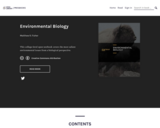
This college-level open textbook covers the most salient environmental issues from a biological perspective.
- Subject:
- Biology
- Life Science
- Material Type:
- Textbook
- Provider:
- eCampusOntario
- Author:
- Matthew R. Fisher
- Date Added:
- 03/09/2020
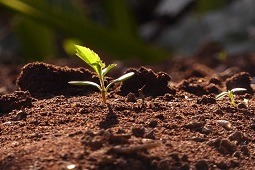

This college-level open textbook covers the most salient environmental issues from a biological perspective.
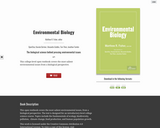
Short Description:
This college-level open textbook covers the most salient environmental issues from a biological perspective. Order a print copy: http://www.lulu.com/content/paperback-book/environmental-biology/23350620
Long Description:
This open textbook covers the most salient environmental issues, from a biological perspective. The text is designed for an introductory-level college science course. Topics include the fundamentals of ecology, biodiversity, pollution, climate change, food production, and human population growth.
Order a print copy: http://www.lulu.com/content/paperback-book/environmental-biology/23350620
Word Count: 95192
ISBN: 978-1-63635-036-3
(Note: This resource's metadata has been created automatically by reformatting and/or combining the information that the author initially provided as part of a bulk import process.)
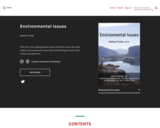
This first-year undergraduate open textbook covers the most salient environmental issues from both biological and social science perspectives.
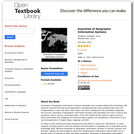
Essentials of Geographic Information Systems integrates key concepts behind the technology with practical concerns and real-world applications. Recognizing that many potential GIS users are nonspecialists or may only need a few maps, this book is designed to be accessible, pragmatic, and concise. Essentials of Geographic Information Systems also illustrates how GIS is used to ask questions, inform choices, and guide policy. From the melting of the polar ice caps to privacy issues associated with mapping, this book provides a gentle, yet substantive, introduction to the use and application of digital maps, mapping, and GIS.
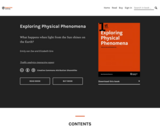
What happens when light from the Sun shines on the Earth?
Short Description:
This course is intended for prospective and practicing elementary and middle school teachers. By exploring physical phenomena in class, you will learn science in ways in which you are expected to teach science in schools or in informal settings such as afterschool programs, youth group meetings, and museum workshops. This course also is appropriate for general science students and others interested in exploring some of the physical phenomena underlying global climate change. Data dashboard
Word Count: 178063
(Note: This resource's metadata has been created automatically by reformatting and/or combining the information that the author initially provided as part of a bulk import process.)
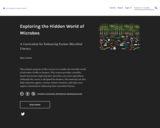
A Curriculum for Enhancing Farmer Microbial Literacy
Short Description:
The primary purpose of this course is to render the invisible world of microbes visible to farmers. This course provides scientific-based instruction exploring how microbes can assist agriculture. Although the course is designed for farmers, this material can also help extension agents, curious citizen scientists, and other non-experts interested in enhancing their microbial literacy.
Long Description:
The invisibility, complexity, and general opaqueness of soil microbial life makes learning about the “black box of soil” difficult. To address this challenge, my project-based biology senior thesis endeavors to develop a biology-based curriculum for farmers to increase microbial literacy. A transition to a microbially centric agriculture necessitates the development of a new knowledge infrastructure. My senior thesis project aspires to contribute to this new, necessary, and expanding infrastructure. It is critical that farmers recognize their unique role as stewards of not only plants and animals but also as shepherds of an unfathomably complex, necessary, and wondrous herd of microbes.
Word Count: 10617
(Note: This resource's metadata has been created automatically by reformatting and/or combining the information that the author initially provided as part of a bulk import process.)
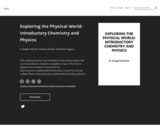
Short Description:
This a physical science text intended for non-science majors that covers introductory chemistry and physics topics. The work is adapted from Chemistry: Atoms First 2e https://openstax.org/details/books/chemistry-atoms-first-2e and College Physics https://openstax.org/details/books/college-physics
Word Count: 29934
(Note: This resource's metadata has been created automatically by reformatting and/or combining the information that the author initially provided as part of a bulk import process.)
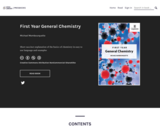
Short succinct explanation of the basics of chemistry in easy to use language and examples
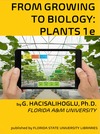
Ready to find out how plants are grown and function? Take a fantastic voyage through plants. From Growing to Biology: Plants 1e brings the latest information for understanding of traditional and modern plant growing, form, and production. Topics covered in 30 chapters include concise and up-to-date ‘big picture’ infographics, student learning outcomes (SLOs), key vocabulary, assessment, as well as identification of 120 species, and more. Moreover, author Dr. G. Hacisalihoglu emphasizes on leaning concepts, binding those concepts together with visuals approach to make learning faster and more memorable.
From Growing to Biology: Plants 1e is packed full of horticultural information that is ideal for both academia and industry growers. It is basic enough that if you are just getting started learning plants, you will be able to catch up. Always remember that practice makes permanent and keep going to take your learning plant bio to new levels.
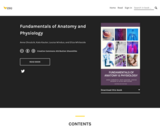
Short Description:
Fundamentals of Anatomy and Physiology is a textbook for biomedical, life science and health majors. The book is organised by body system and contains interactive resources to test your knowledge.
Word Count: 416894
ISBN: 978-0-6487698-5-9
(Note: This resource's metadata has been created automatically by reformatting and/or combining the information that the author initially provided as part of a bulk import process.)
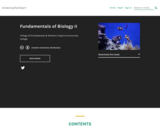
Long Description:
An introduction to biology intended for non-science majors. Focus areas include chemical foundations, cell structure and division, genetics, and evolution.
Word Count: 120840
(Note: This resource's metadata has been created automatically by reformatting and/or combining the information that the author initially provided as part of a bulk import process.)

Conocer los fundamentos teóricos de la química inorgánica es esencial para comprender los conceptos y principios esenciales de esta rama de la química, que se enfoca en el estudio de los elementos y compuestos inorgánicos; proporcionando una base teórica sólida para el estudio de otras áreas de esta ciencia. "Fundamentos Teóricos de Química Inorgánica", además de temas clave de la química inorgánica, como la teoría del enlace de valencia y la química de los elementos, también cubre temas importantes como la estructura de la materia, la teoría cuántica, la estequiometría y la clasificación de las reacciones químicas. Asimismo, se destaca la inclusión de temas relacionados con la medición de las propiedades de la materia, la descripción de los sistemas dispersos, entre otros. El objetivo de este libro es brindar una base sólida de conocimientos en química inorgánica, que permita al lector comprender los principios y fundamentos teóricos que rigen esta disciplina, con un enfoque claro y didáctico. El libro proporciona un excelente recurso tanto para estudiantes como para docentes. Razón por la que, "Fundamentos Teóricos de Química Inorgánica" es una obra esencial para aquellos que deseen profundizar en el conocimiento de la química inorgánica y comprender mejor sus conceptos fundamentales.
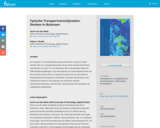
De transport- en overdrachtsprocessen van warmte, massa en impuls worden naar hun analogie behandeld. De processen worden beschreven met behulp van macro- en microbalansen die in veel gevallen leiden tot differentiaalvergelijkingen. Ook veel aspecten van stromingsleer komen op deze manier aan de orde en zo bereidt het boek ook voor op moderne Computational Fluid Dynamics technieken. Het doel van het boek is ook studenten te trainen in het oplossen van problemen waarbij transportverschijnselen centraal staan. Daartoe bevat het boek bijna 100 uitgewerkte vraagstukken.
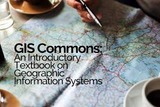
This is not a typical e-book; it is a free, web-based, open-source “textbook” available to anyone interested in using mapping tools to create maps. This e-text focuses primarily on Geographic Information Systems (GIS)—a geospatial technology that enables you to create spatial databases, analyze spatial patterns, and produce maps that communicate more effectively. While this GIS textbook is principally an introduction to GIS, most of the chapter’s concepts are applicable to other geotechnologies including remote sensing, global positioning systems (GPS), Internet mapping, and virtual globes.
Creating good maps and analyzing spatial data is a time consuming and challenging practice, but recently, a new set of powerful mapping tools has enabled almost anyone with a computer to make maps easily and to perform at least some low-level analyses. The results, however, are not encouraging. Most of the new mapmakers do not have adequate training in mapping concepts and spatial analysis principles, and their maps are often improperly designed and do not communicate easily nor effectively. This e-text—GIS Commons—seeks to help you analyze spatial data and communicate more effectively. In short, GIS education is our goal.
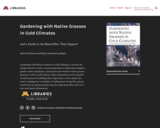
and a Guide to the Butterflies They Support
Short Description:
Gardening with Native Grasses in Cold Climates, is written for inexperienced as well as seasoned gardeners, landscape designers, garden center employees, and anyone interested in native grasses that grow well in cold climates. New information on the benefits of native grasses including their importance as host plants for native Lepidoptera is included. Combinations of specific grasses used by larvae and perennials that the adult butterflies feed on is new and timely information.
Word Count: 10242
ISBN: 978-1-946135-65-0
(Note: This resource's metadata has been created automatically by reformatting and/or combining the information that the author initially provided as part of a bulk import process.)
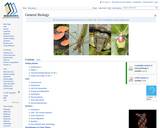
The word biology means, "the science of life", from the Greek bios, life, and logos, word or knowledge. Therefore, Biology is the science of Living Things. That is why Biology is sometimes known as Life Science.
Wikibooks is a collaborative book authoring website, where users from all over the world work together to write textbooks and other types of instructional books on many topics. It is a Wikimedia project, operated by the same group of people who run Wikipedia, the Wikimedia Foundation. You can edit this page, and almost all pages like it, at any time. That is the basic principle of Wikibooks: anyone can edit it.
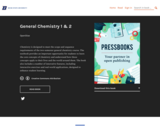
Chemistry is designed to meet the scope and sequence requirements of the two-semester general chemistry course. The textbook provides an important opportunity for students to learn the core concepts of chemistry and understand how those concepts apply to their lives and the world around them. The book also includes a number of innovative features, including interactive exercises and real-world applications, designed to enhance student learning.
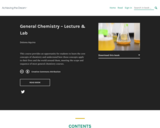
Short Description:
This course provides an opportunity for students to learn the core concepts of chemistry and understand how those concepts apply to their lives and the world around them, meeting the scope and sequence of most general chemistry courses.
Word Count: 202978
(Note: This resource's metadata has been created automatically by reformatting and/or combining the information that the author initially provided as part of a bulk import process.)
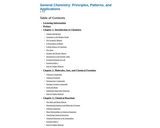
The overall goal of the authors with General Chemistry: Principles, Patterns, and Applications was to produce a text that introduces the students to the relevance and excitement of chemistry.Although much of first-year chemistry is taught as a service course, Bruce and Patricia feel there is no reason that the intrinsic excitement and potential of chemistry cannot be the focal point of the text and the course. So, they emphasize the positive aspects of chemistry and its relationship to studentsŐ lives, which requires bringing in applications early and often. In addition, the authors feel that many first year chemistry students have an enthusiasm for biologically and medically relevant topics, so they use an integrated approach in their text that includes explicit discussions of biological and environmental applications of chemistry.
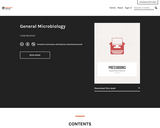
Short Description:
Welcome to the wonderful world of microbiology! Yay! So. What is microbiology? If we break the word down it translates to “the study of small life,” where the small life refers to microorganisms or microbes. But who are the microbes? And how small are they? Data dashboard
Word Count: 39859
(Note: This resource's metadata has been created automatically by reformatting and/or combining the information that the author initially provided as part of a bulk import process.)